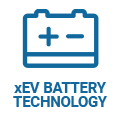
Cambridge EnerTech’s
xEV Battery Technology, Application, and Market
Driving the Future Growth of Electric Vehicles Globally
15-16 MAY 2024
With the significant expansion of vehicle electrification across the globe, automakers are scrambling to develop the vehicles that will not only meet the upcoming stringent emission regulations, but also attract customers and provide viable financial return. In addition, to meet the automakers' requirements, the industry must deliver on lower costs, higher-energy densities, fast charging, as well as safety and durability. This conference will address the trends, challenges, and opportunities that will drive future growth and how the key players are achieving success.